#over an open fire
Photo

#breakfast#campfire cooking#cooking#over an open fire#camp cooking#camping#camp#campsite#campfire#camplife#campout#outdoors#nature#wilderness#discover#adventure#explore
4K notes
·
View notes
Text
Every time I make crepes I gain a new respect for botw link
12 notes
·
View notes
Text

learned something about myself lately
#i dont think its even the fact almost all my characters are somewhat beasts in one way or another. i just#really like tails and wish i had one myself#and then my oc designs are a little tame theyre mostly human shaped with animal features. but they always have tails#my eyes have recently been opened to the appeal of long whiplike unicorn tails.. so flowy and curly#something about the tuft at the end being long and swirly just does something for me..#maybe it would make sense to change auggies tail shape so it looks like a meteor. her design is mainly pink with hot pink accent#so it would be cool to use that and orange to make it look like a fire meteor.. maybe itll help complement the blue/green in her design#head full of ocs today so expect a ramble later#if i had a tail i think it would be long with a kink. so it kind of folds over once but not in a curl#when it wags its kind of a swaying motion. i have thought about this a normal amount#yapping
9K notes
·
View notes
Note
In that case, keep reminding yourself that people shipping with you means they WANT to ship with you, and that your ship doesn’t interfere with or lessen the value of other ships. People may weigh their ships differently in their mind, but that’s not something you need to worry about. It’s normal for people to be biased. It doesn’t mean they don’t like their other ships. I mean this in the most light-hearted way, but having so many people interested in your character reads like a humble brag xD
I knooowww. Brain making me feeling guilty suuuccckkksssss. Sometimes I need to call myself out so brainhole shuts tf up.
And yeah, I realized that after I published it. But!!! Too late to backpedal now. Soapie is a humblebrag. Let the world know and JUDGE me for it.
(retweeted by humblebrag)
#out of snow#send me anon hate this self conscious humblebrag deserves to be dragged#roast me#over an open fire#like a chestnut#also three people is a huge number TO ME
1 note
·
View note
Photo
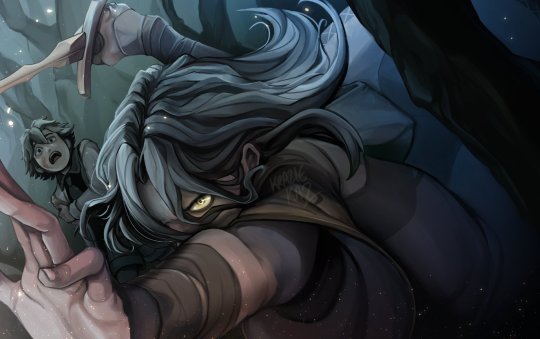
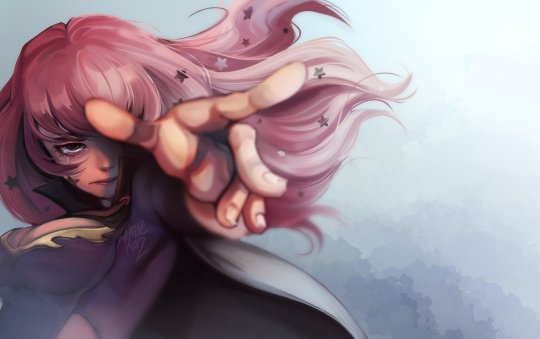
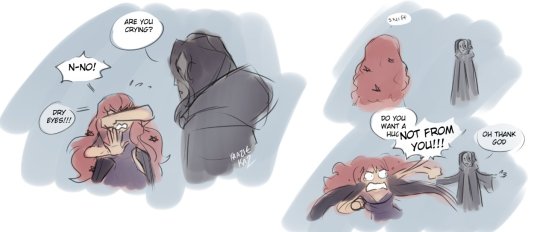
Assassins!! They’re friends!!!!
#I ship em tbh#I think they should open up an orphanage together#fire emblem#fe engage#2023 art#yunaka#zelkov#art like this always does worse than my dumb comics#which is absolutely not surprising btw#I too would rather retweet or reblog silly things#still it does mean I draw stuff like this a lot less in my free time#I am not immune to validation#carrying over my posts from twitter choo chooooo
1K notes
·
View notes
Text
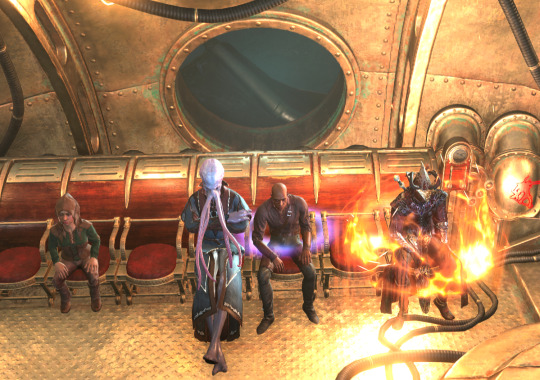
world's most awkward submarine trip
"so, uh, what are you in for?"
#omeluum#ulder ravengard#wyll ravengard#poor ulder#mindflayer on one side#estranged devil son currently on fire on the other#I put ulder one seat away bc the fire and then had omeluum sit right next to him#the subsequent cutscene is KILLING ME#it was Astarion's POV for some reason#he climbed up with halsin beckoning (nvm that he was chilling safely for like 3 turns)#looked over at omeluum with this face of 'I'm not even gonna ask'#went over to Ulder and they hung out awkwardly for a second and Ulder left#I actually got everyone it was so satisfying#even the people who were free but not literally in the submersible came up with us#finding out that ranged attacks open the doors was a huge help#bg3#baldurs gate 3#bg3 spoilers
149 notes
·
View notes
Text
I will never not be absolutely gutted at the fact that Soren grew up in a world that hated him, alone and scared, and turned into someone deeply untrusting when all along he had a family that loved him. Loved him enough to sacrifice themselves for a chance to save him.
He had a mother that never stopped loving him and uncles that would have adored him, did adore him. And he never knew them and they never found him.
It kills me that they loved him. It's so unfair that they love him and he never knew.
#hello i'm deeply unwell over the goldoan family again#this is why i like so much the idea of soren going back to tellius after ike dies and reconnecting with his family#he's not ready to trust at the end of radiant dawn but i think eventually he would want to#and they would receive him with open arms no matter how much time has passed#if you excuse me i'll be crying#fe soren#fire emblem radiant dawn#fe10#tellius
379 notes
·
View notes
Text
The more I learn about Civil War politics, the more I'm convinced that Lincoln's most impressive and useful leadership trait was that he never let his pride get in the way of doing his job.
Other people in Lincoln's position would have come to Washington with something to prove. They'd have resented the insults and tried to disprove them. They'd have tried to seize power and credit, rejected help, spent a lot of time trying to reach a certain level of respect.
Lincoln's response to, "You're just a backwoods lawyer with no executive experience who makes too many dumb jokes," was pretty much always, "Yeah. And?" He had no interest in petty personal power plays. He had a country to run. There was a war on. It didn't matter what people thought of him so long as the job got done.
He was aware of his personal shortcomings and was always willing to accept advice and help from people who had more knowledge and experience in certain areas. He presided over a chaotic Cabinet full of abrasive personalities who thought they were better and smarter than him, but he kept working with them because they could get the job done. For example: Stanton was absolutely horrible to him when they were both working as lawyers. Just incredibly mean on a personal level. But when Lincoln needed someone to replace Cameron, he swallowed his pride and appointed Stanton as Secretary of War, where Stanton proceeded to be mean to everyone in the world, but he whipped that department into shape and kept it running efficiently through a very chaotic war. Pretty much no one except Lincoln would have been able to put up with that. He could put up with people who were personally difficult if they could do the job he needed them to do--which he was only able to do because his own ego didn't get in the way.
Lincoln's example is a prime demonstration of how humility isn't underrating yourself--it's being so secure in your own abilities and identity that you don't need to attack anyone or defend yourself to prove your worth. He knew his shortcomings, but he also knew his strengths. He was willing to give other people credit for successes and take blame upon himself for failures if it kept things running smoothly. He was secure enough in his own power that he could deal generously--but firmly--with people who tried to undermine him. In a city full of huge egos, in a profession that rewards puffed-up pride, that levelheaded humility is an extremely rare trait--which is what made it so impressive and effective.
#history is awesome#presidential talk#so i went to a teeny backwater thrift store today#their tiny history book section just happened to have an old lincoln biography#i opened to the page about the cabinet#which describes the situation like 'seward was calling himself premier and lording it over everyone'#'blair was causing problems everywhere'#'welles was insulting everyone in his diary and especially hated stanton grant and seward'#'and stanton hated absolutely everyone in the whole wide world'#and as i was reading this i was internally kicking my legs with excitement and cackling with glee because this is the good stuff#i don't know why but i love these horrible petty men#they're like a bunch of raccoons fighting over territory in a dumpster fire it's so great#i read the whole chapter right there in the store#and it impressed upon me yet again how impressive lincoln was to put up with all these guys#(the writer was a bit simplistic and made a lot of these guys come off as worse than they were)#(like he made seward sound like a complete incompetent when he was a pretty good secretary of state)#(he had some grandiose ideas but the man deserves a lot of credit for keeping england out of the war)#(but for a one-chapter summary of these guys it wasn't exactly wrong and it was a ton of fun)#i very much did not want another book especially another american history book#but it was only fifty cents and i have a pouch full of spare change#and the writer's style was so much fun that i decided to take the book with me#i don't plan to read the whole thing (i'm sick of lincoln bios) but it's fun to dip into for things like this#and i had to talk to you about it
215 notes
·
View notes
Text
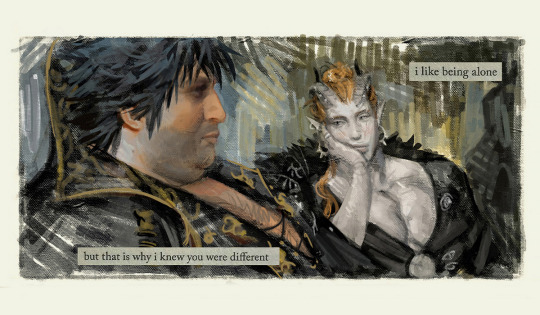
have the first panel separately too just because zooming on this app is horrendous sometimes🤲 (full thing here)
#gortcas#cas' stupid gentle expression whenever he looks at Gortash vs his “thinking abt roasting u over an open fire” expression he gives others#him keeping his gaze on Gortash at all times in public to make sure nothing happens but then he just stares like a lovesick puppy....😩
122 notes
·
View notes
Text
Screaming from the crypt (or how the past haunts the present on Midnights)
I know it's been discussed so much since Midnights came out but just.
I love how there is such a clear narrative throughout the album (and perhaps especially on the 3am/Vault tracks). About questioning and regret and choices and coming to terms with all of it. It is one long story about how we're all a mosaic of the choices we make, each one taking something from us and leaving something else in its place.
(And now a disclaimer: I'm looking at this mostly through a narrator/subject lens, and trying not to dive too deeply into real-life events or speculation except for in a general sense. For this purpose I like to look at the body of work as art, like literature, because I find it makes it easier to see the common threads in the different songs and cohesion in the narrative.)
In looking at the 3am+ tracks in particular, it's fascinating how some turns of phrases or themes repeat themselves in different songs, in different contexts. (I'm only focusing on the non-standard tracks because there are too many songs and I'd be here all day but I bet I could do a part two lol.) I know many people have pointed out the parallels throughout her discography already and I’m not saying anything groundbreaking by writing this, but I love how these parallels run through in the same album, because it makes it seem like it's one long story, or at least, one long rumination on many different stories that are coalescing into a single narrative.
Battle (let’s go)
For instance, the one that jumped out at me when I started writing this post the other week was, "Tore your banners down, took the battle underground," in The Great War and "If clarity's in death, then why won't this die? Years of tearing down our banners, you and I," in Would've, Could've Should've. It's a story about staying stuck in the same cycle of reliving trauma and coping mechanisms and bad habits over and over again and fantasizing about how taking the “antagonist” out and gaining the upper hand for good would bring closure (WCS), but the truth is that nothing ever will. All that cycle does, though, is repeat itself in other situations, and in this case pushes someone away the narrator cares for (TGW). The difference is that the imagined battle in WCS is a two-way street in her mind (that is ultimately unwinnable because it was never a fair fight), but in TGW it's one-sided -- she's the one fighting dirty, taking shots, the way she'd been doing in her imagination (or nightmares) all these years. But the person in front of her isn't fighting back the way the person in her mind in WCS would, because their intentions are honourable instead of exploitative.
And that's paralleled in another pair of lyrics from the two songs, "And maybe it's the past talking, screaming from the crypt, telling me to punish you for things you never did," (in TGW) and "The tomb won't close, I fight with you in my sleep," (in WCS). In both cases, the funeral imagery makes it seem like this past event should be dead and buried in WCS, but it keeps rising from the dead, haunting her no matter what she does and in TGW, another (or perhaps the same?) tomb that won't close keeps unleashing new ways to hurt her and in turn the new person in her life. In other words, the trauma from the past continues to bleed into the present.
(Again from a literary point of view, I'm not saying the events of the two songs are linked IRL, but they're fascinating textual parallels on the album as a string of chapters, which is why Dear Reader is so compelling, but that's a whole other essay.)
To keep the battle motif going, there’s yet another parallel, this time between TGW’s "[You were a] soldier down on that icy ground, looked up at me with honor and truth," and You’re Losing Me’s "All I did was bleed as I tried to be the bravest soldier, fighting in only your army.” In the former, the subject is laying down his armour in the war she’s projecting onto him, waving the white flag, and she realizes that she’s about to destroy something if she doesn’t put her sword down too. By the time we get to YLM, the roles are almost reversed; at the very least they’re supposed to be on the same team, but in this case she’s doing all the heavy lifting, fighting for their relationship in contrast to his apathy killing it. It’s also pretty interesting (if not outright intentional) that one of the 3am+ editions of the albums starts with The Great War, where they find themselves in conflict (even if it’s in her head) that ends in a truce, and ends with You’re Losing Me signalling the end of the relationship, evidence that the resolution in the first song wasn’t an ending but merely a ceasefire before the last battle.
Putting the rest under a cut because this is waaaaay too long now ⤵️
(There’s also another metaphor there in The Great War with its battle imagery: World War I, aka The Great War, was supposed to be the war to end all wars, because loss on its scale was never seen before and when it ended, most thought never again would the world embroil itself in such battle, the horrors and implications were so devastating. Two decades later, the world found itself in WWII, with an even larger scope and more horrific consequences, the intervening time between the two a period of festering conflicts and resentment leading to some of the worst acts the world would see. Bringing real life into it for a second, there’s something a little poetic, though sad, about The Great War the song being about a fight that could have ended the relationship that they ultimately resolved and was meant to be evidence of the strength of their love, but so too did it end up being a period of détente, the greater battle coming for them years later. But that is not the point of this post.)
If one thing had been different
Another major theme in these editions is pondering the "what ifs?" of life, but I think it takes on even more significance in the broader context of the album in the lyrics of "I'm never gonna meet what could've been, would've been, should've been you," in Bigger than the Whole Sky and the repetition of would've/could've in Would've, Could've, Should've (I would've looked away at the first glance, I would've stayed on my knees, I would've gone along with the righteous, I could've gone on as I was, would've could've should've if I'd only played it safe, etc.) In both songs, the narrator is mourning an alternate course their life could have taken* and questioning what they could have done differently, in the aftermath of trauma and loss, and the regret that comes with that loss, and with the loss of agency in the situation because ultimately it was never in their hands. In an album full of questions, wondering about the path not taken, or the forks in the road that have led to a different version of your life, it's digging deeper into the contrast of choice vs. fate, action vs. reaction, dwelling on the past vs. moving on. When you're supposed to let go of the past, what do you do when it is holding your future hostage?
(*I know there are different interpretations/speculation about BTTWS which I am not getting into on main. I'm just saying that whatever the song is about, it's grieving something that never came to be. The literal origin of the song is less important to the album than the sense of loss it portrays. Whatever the inspiration is, it's crafted to tell part of the story of Midnights of ruminating over how, to borrow from her previous work, if one thing had been different, would everything be different?)
(Also I was today years old when I realized that the words are inverted in the two songs. Apparently I've been hearing BTTWS wrong this whole time.)
There's also an interesting tangent in the role of faith in both songs: in WCS, the events of the story cause her to lose her faith (e.g. "All I used to do was pray," "you're a crisis of my faith,") and question all the things she felt had been unquestionable until that point in her life (e.g. "I could have gone along with the righteous"), whereas in BTTWS, she questions whether that very lack of faith is to blame for the loss in that song ("did some force take you because I didn't pray? [...] It's not meant to be, so I'll say words I don't believe"). It's like pinpointing the moment her life changed and upended her beliefs (WCS), but as a result then leaving her unmoored in times of crisis because ultimately there's no explanation or comfort to be taken from what she used to hold true before that (BTTWS). The words she once relied upon to guide her have long since lost their meaning, but in times of trouble it leaves her wondering if that faith she once held then lost could have prevented this pain.
(Shoutout to WCS for being Catholic guilt personified lol.)
To keep on with the vaguely faith-y notions, an obvious parallel is the line in Would’ve Could’ve Should’ve about, “I damn sure never would've danced with the devil at nineteen,” and, "When you aim at the devil, make sure you don't miss," in Dear Reader. All of WCS is about her fighting with an antagonist who haunts her, with whom she wholly regrets ever becoming involved. DR could be seen as a reflection on that fall from grace, warning the audience that if you choose to go after the person (or thing) haunting you, make sure you do so clearheaded enough to be decisive. Again, these “devils” may not be related in real life: the IRL devil in DR could be speaking about her naysayers, or Kim*ye, or Scott & Scooter B, etc., meaning not to cross your enemies until you know you can win. But taking real life out of it and looking at it textually, I am intrigued by the link between WCS and DR, so that’s what I’m going with here. And perhaps that’s even the point in a wider sense; there will be multiple “devils” in your life, or threats to your well-being. If you’re going to commit to taking them down — whether it’s an actual person, or the demons inside you that refuse to let you go — make sure you have the right ammo so that they can no longer hurt you. (Of course, one lesson from these experiences is that sometimes you can’t win, and you have to live with the fallout.)
(Sidebar: I know that “dancing with the devil” is a turn of phrase that means being led into temptation and engaging in risky behaviour, as opposed to describing the actual person. Given the religious metaphors in the song, that could very well be/is the intention, particularly when it’s preceded by, “I would have stayed on my knees” as in she would have continued to follow her faith — in whatever sense that means — had she never met this person, which could also be a more eloquent way of saying she would have continued to be live her life in a way that was righteous (even naive) and seen the world in black and white. Either way, it’s a force she wholly rejects. Like I said, multiple devils, same fight.)
Regret comes up too: in WCS, she says, "I regret you all the time," obviously directed at the person who manipulated her and led to her perceived downfall, citing him as the one impulse she wished she'd never followed, because it won't leave her no matter how hard she’s tried. In High Infidelity, she tells the person to, "put on your records and regret me," and on the surface, it’s like she’s turning the tables, painting herself as the one now causing the regret in someone else, the one inflicting the pain this time. Yet the verse preceding it and the lines following it in the chorus depict a partner who is also emotionally manipulative and vindictive like in WCS (“you said I was freeloading, I didn’t know you were keeping count,” “put on your headphones and burn my city,”). It’s not so much that she’s intentionally harming the person (the way the person in WCS does to her), but rather that the venom in the subject’s feelings towards her seeps through; she’s imagining the way he’s going to feel about her when she leaves, hating her just for by being who she is. (There could be another tangent about how in both songs she’s there to be a “token” in a game for both of the men, who play her for their own purposes.) The regret is dripping with disdain. It’s as though she’s picturing how the person is going to hate her for doing what she’s thinking of doing the way she hates the person who first hurt her.
Sadness, unsurprisingly, shows up in a few lyrics. In BTTWS, “Everything I touch becomes sick with sadness,” sets the scene of a person so overcome with grief that it permeates everything around them; they cannot see their way out of it and feel like the fog will never lift. In Hits Different, it’s, “My sadness is contagious,” the result of a breakup where the person’s grief again touches everything and everyone around them, pushing them further in their despair and loneliness. The reason behind the grief in either case may vary, but regardless of the source, the feeling is overpowering and isolating. They may be different chapters in the story, but the devastation is hauntingly familiar. (As is a recurring theme in Midnights as a whole: there are situations and feelings that present themselves at different points in her journey and colour in the lines in different ways along the road. Like revisiting an old vice and realizing the hit isn’t quite the same as it was in the past.)
Death by a thousand cuts
She also writes about wounds on this album, which isn't surprising I suppose given that the whole conceit is that these are things that have kept her up at night over the years. WCS is perhaps the driving narrative on this never ending hurt when she sings, “The wound won't close, I keep on waiting for a sign, I regret you all the time,” suggesting that no matter what she does, the pain of this experience has permeated everything she’s done afterwards. (Not unlike the overwhelming grief in BTTWS, for instance.) Elsewhere, in High Infidelity she sings, "Lock broken, slur spoken, wound open, game token," and in Hits Different, "Make it make some sense why the wound is still bleeding.” Again I'm not suggesting they're about the same events; the line in HI is about a situation where a partner crosses a boundary, hits below the belt, picks at an insecurity (or creates a new one) and treats the relationship like it's transactional, opening the floodgates in turn. In HD, the wound seems to be more self-inflicted, where she's pushed the person away. (Over a situation real or imagined she feels she needs distance from.) But again, something has picked at her like a raw nerve, and just like in the past, she's hurting, even in a different time and place and person. Almost like the wounds of the past break open over and over again to create new scars. If one were to extrapolate further, it wouldn’t be the biggest leap to wonder if the wound open in WCS, then torn apart in HI makes the one in HD hurt even more.
(I once wrote a post about how I think as time goes on, WCS is going to turn into one of those songs that will be found to drive so much of her work, because it’s just… kind of the unsaid thesis statement of so much of her songwriting.)
Another repeated theme is that of the empty home and loneliness. In High Infidelity, she sings, "At the house lonely, good money I'd pay if you just know me, seemed like the right thing at the time," painting a picture of someone who may have everything they'd want to the outside world, but in reality feels metaphorically trapped in their home (or at least alone amidst abundance), a symbol of a relationship gone sour and a failure to build connection. She just wants someone to understand her, want her for her, but as she's written earlier in the song, she's just a pawn in the game, a trophy from the hunt. Home, in this case, is lonely, isolated, an emblem of her fears. In Dear Reader, she continues this thread, then singing, "You wouldn't take my word for it if you knew who was talking, if you knew where I was walking, to a house not a home, all alone 'cause nobody's there, where I pace in my pen and my friends found friends who care, no one sees you lose when you're playing solitaire." It's the same idea, admitting to listeners that the gilded cage she lived in kept her distanced from her loved ones and real connection, keeping her struggles close to the vest but feeling desperately lonely amidst her crowning success. She's pushed people away and it may have felt like the right thing at the time, but in the end maybe felt like she was trapped. And when you push people away, eventually they take you at your word and stop pushing back; you’re a victim of your own success at isolating yourself. What starts out of self-preservation then further perpetuates the underlying problems.
(There's another interesting link about "home" also feeling unsafe with HI's "Your picket fence is sharp as knives," which further leads into the theme of marriage/domesticity feeling dangerous, which is a whole other thing I won't get into here because it's another discussion and may derail this already gargantuan word salad.)
In a slightly similar vein, we have the metaphor of bad weather for a rocky road or unstable relationship, in High Infidelity again with, "Storm coming, good husband, bad omen, dragged my feet right down the aisle" and You’re Losing Me’s "every morning I glared at you with storms in my eyes.” They aren’t speaking of the same situation or even same kind of breakdown, but it is pretty interesting how the idea of clouds/storms/floods/etc. play such a role in Taylor’s music to signal depression, apprehension, fear, uncertainty, etc. In HI, I think the “storm” coming is the looming threat of commitment to a partner who makes the narrator uneasy (if not fearful). In this case, the idea of making a life with this person is not one that incites joy or comfort, but instead makes the narrator feel that dark times are ahead if she continues down this path. Perhaps in some way, the “storms” in YLM have made good on the threat in HI in a different way; it’s a different home, a different relationship, but the clouds have settled in regardless, and some of her fears have come to fruition in ways she did not expect. The person she once trusted no longer sees her or her struggles (or worse, doesn’t care), and the resentment and pain build with each passing day.
Coming back to heartbreak, one of the obvious "full circle" moments is the beginning of a relationship in Paris, where she says that, "I'm so in love that I might stop breathing," clearly enthralled in a new love that allows her to shut the world out and grow in private, capturing the all-encompassing nature of the relationship. This infatuation has consumed her in the most wonderful way (in contrast to the sorrow of some of the previous songs), and it feels like a life-altering (or even life-sustaining?) force that is so strong she may forget what it’s like to breathe. (Metaphorically speaking, of course.) By the end of the album, though, in You're Losing Me, that heart-stopping love has become a threat: "my heart won't start anymore for you." In the former, her racing heart is full of excitement, but by the latter, her heart has given out completely under the weight of the pain she bears. (YLM is full of death/illness imagery which I already wrote about awhile ago so I won't hear, but needless to say that song deserves its own essay for so many reasons.) She's gone from the unbridled joy of the beginnings of a relationship to the unrelenting sorrow of its end, two sides of the same coin.
Love as death appears elsewhere in the music too, for instance, in High Infidelity’s, “You know there's many different ways that you can kill the one you love, the slowest way is never loving them enough" and You’re Losing Me’s “How can you say that you love someone you can't tell is dying? […] My face was gray, but you wouldn't admit that we were sick.” Though not completely analogous situations, they both tell the tale of one partner’s apathy (or at least denial) destroying the other. In the former, the partner’s actions (or inaction) are more insidious, if not sinister; in the latter, the lack of momentum (or admission of a problem) is passive. In both cases, the end result is the narrator’s demise; it’s a drawn out affair that chips away at her morale and her health and her sense of self. (Breaking my own rule about bringing in alleged actual events into the discussion, but the idea that the relationship in High Infidelity, which was obviously fraught with unease and even fear, ended in a similarly excruciatingly slow and hurtful death by a thousand cuts as the relationship in You’re Losing Me almost did at that time must have been so painful. It almost feels like YLM is wondering why what used to be a source of light in her life was mirroring a situation that caused her such pain in the past.)
From the same little breaks in your soul
I said early on that part of what is so compelling about Midnights is that it feels like an album about ruminating — on choices, on events, on people — and the two final “bonus” tracks of the album depict that as well. In Hits Different, she sings that, “they say if it’s right, you know,” an ode to the confusion of a breakup and struggling with the aftermath of calling it quits. It’s a line that has always intrigued me, because the typical use of the phrase is in the sense of, “you’ll know when you meet the one,” but here it seems to have a double meaning, a reassurance perhaps from the friends (who later on tell her that "love is a lie") that she’ll know if she’s made the right decision in calling it off, but could also be her wondering if the relationship is right, she’ll know, and want to reconcile. In the final bonus track, You’re Losing Me, she sings, “now I just sit in the dark and wonder if it’s time,” this time leaving no doubt about the dilemma she faces, though it’s no less fraught. She’s wondering, perhaps for the last time, if now is finally the moment to end the relationship for good. They say that if it’s right she’ll know, and now she’s wondering if that feeling inside her (that once told her her partner was the one, which is why it hit differently), is telling her that it’s time to go for good. Wait Alexa play “It’s Time To Go.” These are not only the things that keep her up at night, but the things that play over in her mind like a film reel in her waking hours.
Midnights as a whole is a deeply personal album, as is most of Taylor's work, but the 3am+ edition tracks seem to dig even deeper to a lot of the issues raised on the standard album. Almost like the standard tracks are the things she wonders about on sleepless nights, but the bonus tracks are the things that haunt her in the aftermath. The regret, anger, sadness, grief, relief, even joy— they’re the price she pays for the memories she keeps reliving. Midnights might be the most cohesive narrative of all her albums, and really does feel like we’re watching someone work through her journal over time, stopping short of outright naming those giant fears and intrusive thoughts (except for when she does) but making them plain as day when you connect the songs together, and perhaps never more clearly than in the expanded album. It’s incredible how the songs stand on their own to relay a specific moment in time, but that they are also self-referential to each other (whether thematically or overtly) to weave a larger web over the entire work. We’re so lucky as fans to have these stories and to keep peeling back these layers as time passes. (And my literature-analysis-loving ass loves her even more for it.)
This is obviously by no means an exhaustive list, and I know there are more parallels and probably even stronger links (particularly when you add the standard version into the mix), but these were the ones that particularly struck me and I’m just glad I’ve had a chance to sit with this and think it through. ❤️
#writing letters addressed to the fire#me thinking too hard about taylor lyrics#taylor swift#midnights#long post#lyrics analysis#song parallels#Gabby this one is for you friend <3#here goes nothing#Happy Friday or something idk!#(also i know i said there are things i wouldn’t discuss on main but my dms are open lol)#this is not as structured or well plotted out as I wanted it to be#and turned out to be more stream of consciousness than legit essay#but whatever at least i got my thoughts out there and it can release some plot of land in my brain for other stuff to think over lol#If anyone ever reads this thank you! And I’m sorry?#The best compliment i ever got in school#was when we were doing an analysis of a poem in English lit in college#And i brought something up casually#and my prof went ‘I’ve been teaching this class for eight years and that’s the first time anyone’s ever brought it up like that’#’and that just blew my mind’#and i was like ‘who me?’#so that’s all you need to know about me lol#Midnights: The Great War#Bigger than the whole sky#bttws#Midnights: Paris#Midnights: high infidelity#would’ve could’ve should’ve#Midnights: dear reader#midnights: bigger than the whole sky
70 notes
·
View notes
Text
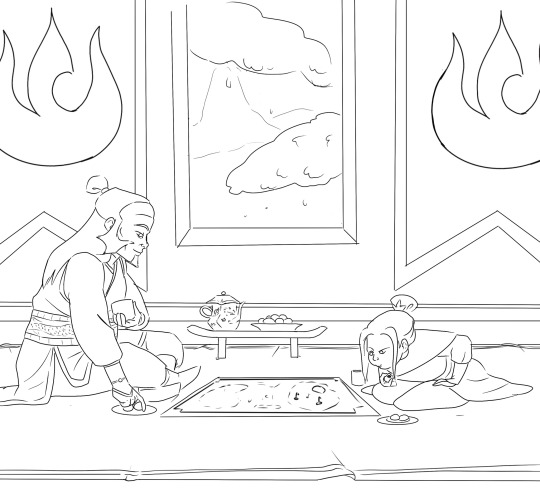
"Iroh ignored Azula” Well what if I didn’t believe that and the greatest irony of Avatar is that Iroh was one of the folks who encouraged her strategic thinking that she would use to later hunt him down
#atla#Azula#Iroh#my art#did he fail her? Yeah probably#homeboy had his own set of issues like continuing his father's conquest#he really didn't have time for either her or Zuko#and if Zuko really was born kind of meek to a very competitive family#who's to say Iroh paid much attention to him?#And put favor towards Azula?#and then he's gone for the siege and then an unknown amount of time for his spirit journey#and comes home and Azula is firmly not interested in Iroh#but Zuko who has been ignored and belittled by his father may seek Iroh out#to which Iroh would be open to but he's still messed up over his own issues#and being on the boat during Zuko's exile creates that bond#So Iroh would escape the favoritism aspect of the Fire Nation and show love towards the 'imperfect' son#while Azula has Ozai's favor#Which itself isn't healthy#but idk I can't hate Iroh for a series of events set before his time in which there's going to be a definite loser#and he's already lost#so he's going to try and help someone even if he doesn't really know how nor does he have the motivation at first#but then his care for Zuko grows and he realizes he wants that again and will do what he can#I'll gladly take the imperfect character who at least tries to have his heart in the right place
789 notes
·
View notes
Text
"Sunlow is boring they're so underdeveloped and the dynamic doesn't make sense and people only ship them cause they're gay" and then they go and rave about how Qinter is the best ship ever made
#Openning fire at this point I don't care anymore#Y'all pass over the canon sapphic relationship just cause it's “boring”#and then hail the most generic husk of a ship dynamic as if it's some golden standard for relationships#“Oh but Qinter isn't all that it can be better in fandom” I'm gonna to write so hard about these women you don't even know#sp-rambles#wof
34 notes
·
View notes
Note
Dang. for someone who claims to be super lazy, you do a lot of mental gymnastics lol.
Dude, just own it and ask her out
......
can you guys go back to asking about music and death and whatnot instead?
45 notes
·
View notes
Text
au where no it wasn't misinformed zuko and aang who created republic city, who decided they knew what's best for the people living in the colonies despite no one in the gaang having experienced the fire nation's colonization of the earth kingdom, it was jet, jet who survived the violence against him by both his fire nation oppressors and the earth kingdom's secret police that served the interests of the government, jet who lived through the fire nation's colonization of the earth kingdom, jet who has had enough of it all and leads a revolution in his home against the fire nation who's oppressed them for 100~ years and the earth kingdom's ruling class. this of course would result in a very different republic city than in canon though.
#atla au#jet atla#honestly jet should get a chance to live and not fight but hes like the best character for the job#i think the colonies are a very tricky situation bc there are mixed families that ofc live there and you cant just ask those families#that have lived there for 100 years to leave#but also richer colonists have oppressed the native populations for decades now#and the fire nation should not have control over the colonies anymore whatsoever#which i haven't watched lok but the situation painted by the comics shows that while the fn has political control over the new nation#so just let jet lead a tiny little revolution guys#he doesn't start in book 1 with very good ideas but hes obvi open to change in book 2#and sees the faults in the ek government so has reason not to want to be ruled by them#plus hes always hated the upper class#avatar#atla#avatar the last airbender
818 notes
·
View notes
Text
Open dragon request!!
Wings of fire peeps this is to you too!
I wish to see all of the dragons ocs! And I wanna see if I can doodle them!!!
Send a message or request!
Something like this?? Idk I see what the vibe is!!!

#dragons#wings of fire#wingsoffire#wof art#ask me stuff#new friends#ask me anything#art#new to the community#new to tumblr#my art#traditional art#traditional drawing#oc art#taking request!#reqs open#japanese dragon#dragon art#request open#send me stuff#send me your ocs#hand them over#let me draw#furry artist#furry#dragon furry#dragon fursona
21 notes
·
View notes
